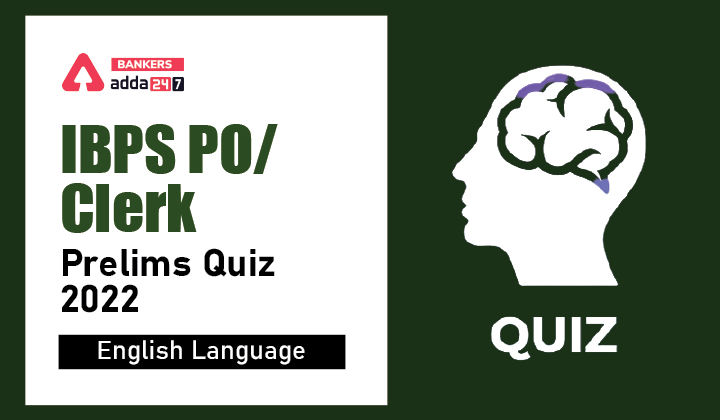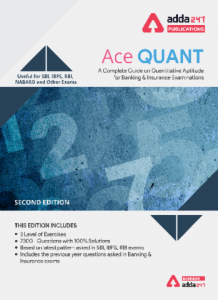Directions (1-5): Rearrange the following seven sentences (A), (B), (C), (D), (E) and (F) in the proper sequence to form a meaningful paragraph then answer the questions given below them.
(A) The political class has also become a prisoner of an electoral system that needs vast amounts of unaccounted money which can come only from organised crime and dubious government deals.
(B) In this democracy, the politician appoints, rewards and punishes bureaucrats and not the other way round.
(C) This explains why recently a joint parliamentary committee flogged down the suggestion for an autonomous vigilance commission.
(D) Political corruption generates internal violence and vulnerability to external threats.
(E) While bureaucratic corruption has been endemic, today the engine of corruption is primarily political.
(F) In that sense, it is one of the greatest national security threats this country faces.
Q1. Which sentence should be the FOURTH in the paragraph?
(a) A (b) B
(c) C (d) D
(e) E
Q2. Which sentence should be the LAST in the paragraph?
(a) A (b) B
(c) C (d) D
(e) E
Q3. Which sentence should be the FIRST in the paragraph?
(a) A (b) F
(c) E (d) D
(e) C
Q4. Which sentence should be the SECOND in the paragraph?
(a) A (b) F
(c) E (d) D
(e) C
Q5.Which sentence should be the THIRD in the paragraph?
(a) A (b) B
(c) C (d) D
(e) E
Directions (6-10): Find out the error, if any. If there is no error, the answer is (e), i.e. No error. (Ignore the errors of punctuation, if any.)
Q6. The scheme failed because (a)/ some states could not (b)/ mange not to raise (c)/ the necessary funds.(d)/ No error (e).
(a) a
(b) b
(c) c
(d) d
(e) e
Q7. Real estate prices in the (a)/ business district of the city (b)/ are expected to rise (c)/ at 15% this year. (d)/ No error (e).
(a) a
(b) b
(c) c
(d) d
(e) e
Q8. By so early as next year (a)/ the leading investment bank (b)/ has plans to open (c)/ an office in New Delhi. (d)/ No error (e).
(a) a
(b) b
(c) c
(d) d
(e) e
Q9. There is lots of (a)/ supports from the employees for (b)/ the proposal to (c)/ merge with the parent company. (d)/ No error (e).
(a) a
(b) b
(c) c
(d) d
(e) e
Q10. Experts have recommended that (a)/ the government reconsidered (b)/ restrictions imposed on foreign (c)/ investment in real estate. (d)/ No error (e).
(a) a
(b) b
(c) c
(d) d
(e) e
Directions (11-15); In each of the following sentences, there are two blank spaces. Below each sentence there are five pairs of words denoted by numbers (a), (b), (c), (d) and (e). Find out which pair of words can be filled up in the blanks in the sentence in the same sequence to make the sentence grammatically correct and meaningfully complete.
Q11. Great saints believe that realisation of God will liberate man from ______ bondage and this state of release confers the privilege of serving the Lord in his ______ abode.
(a) materialistic, permanent
(b) earthly, transcendental
(c) primitive, unique
(d) spiritual, ethereal
(e) antique, original
Q12. Biological clocks are of such ____ adaptive value to living organisms, that we would expect most organisms to ____ them.
(a) meager – evolve
(b) certain, achieve
(c) significant – eschew
(d) obvious – possess
(e) important- restrict
Q13. Before his marriage the Duke had led an austere existence and now regarded the affectionate, somewhat ____ behavior of his young wife as simply ____
(a) restrained – despicable
(b) childish – elevating
(c) playful – sublime
(d) frivolous – puerile
(e) childlike-slanting
Q14. Today Wegener’s theory is ____ ; however, he died an outsider treated with ____ by the scientific establishment.
(a) unsupported – approval
(b) dismissed – contempt
(c) accepted – approbation
(d) unchallenged – disdain
(e) rejected- consent
Q15. We can coax physical nature into ________ many of our wishes but we cannot ________ authority over it or make it change its ways one jot.
(a) granting, empower
(b) satiating, display
(c) satisfying, exercise
(d) stimulating, exercise
(e) agreeing, enhance
Solutions
S1. Ans. (b)
Sol. The correct sequence is DFEBC.
S2. Ans. (c)
Sol. The correct sequence is DFEBC.
S3. Ans. (d)
Sol. The correct sequence is DFEBC.
S4. Ans. (b)
Sol. The correct sequence is DFEBC.
S5. Ans. (e)
Sol. The correct sequence is DFEBC.
S6. Ans. (c)
Sol. Double negatives should never be used in a sentence. It makes an error. So, remove ‘No’
S7. Ans. (d)
Sol. By/to should be used in place of ‘at’
S8. Ans. (a)
Sol. Replace ‘so’ with ‘as’ because correct expression is As+Adverb+As
S9. Ans. (b)
Sol. Use ‘support’ in place of ‘supports’ because it has been used as an uncountable noun here.
S10. Ans. (b)
Sol. Since the sentence is in the present tense, use ‘reconsiders’ in place of ‘reconsidered’
S11. Ans. (b)
Sol. Man has to be liberated from ‘earthly’ or ‘materialistic’ bondage and he should be united with ‘spiritual’ bondage, and hence ‘spiritual’ in option d would distort the sentence.
When man’s life is materialistic, God’s abode should be the opposite of ‘materialistic’. But ‘permanent’ does not suggest that. Whereas ‘earthly’ and ‘transcendental’ are antonyms and are the most appropriate word in the given context.
S12. Ans. (d)
Sol. The sentence structure suggests that if biological clocks are a great advantage, then most organisms would possess them. [Or, if they are not an advantage, then organisms will not have them.]
Therefore, the obvious value, leads us to expect that organisms possess them.
S13. Ans. (d)
Sol. The behavior of the wife is described as ‘affectionate’ and so we require a word of similar weight for the first blank. Hence we eliminate ‘restrained’ and ‘unpleasant’. Also the Duke is described as ‘austere’ and is unlikely to approve of affectionate behavior. And so from the remaining choices we choose the negative word puerile.
S14. Ans. (d)
Sol. ‘however’ indicates a contradictory statement, and therefore we need opposite ideas in the two halves of the sentence. So, Wegener’s theory is unchallenged (everyone accepts it); however he was treated with disdain (contempt). Also the word ‘outsider’ in the sentence indicates that the second blank will have to be a negative word.
S15. Ans. (c)
Sol. We can satisfy the wishes and exercise authority over someone or something.





 GA Capsule for SBI Clerk Mains 2025, Dow...
GA Capsule for SBI Clerk Mains 2025, Dow...
 The Hindu Review October 2022: Download ...
The Hindu Review October 2022: Download ...
 SBI Clerk Prelims Result 2025 Out, Direc...
SBI Clerk Prelims Result 2025 Out, Direc...







